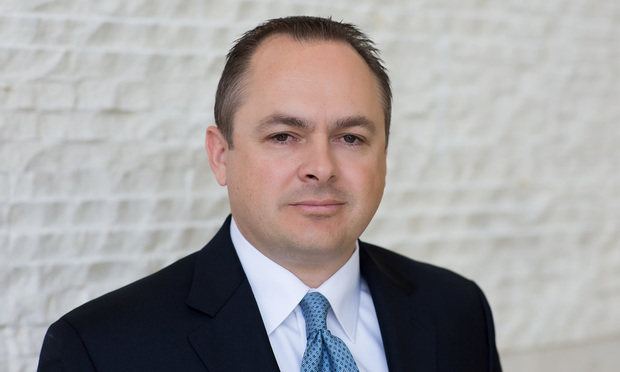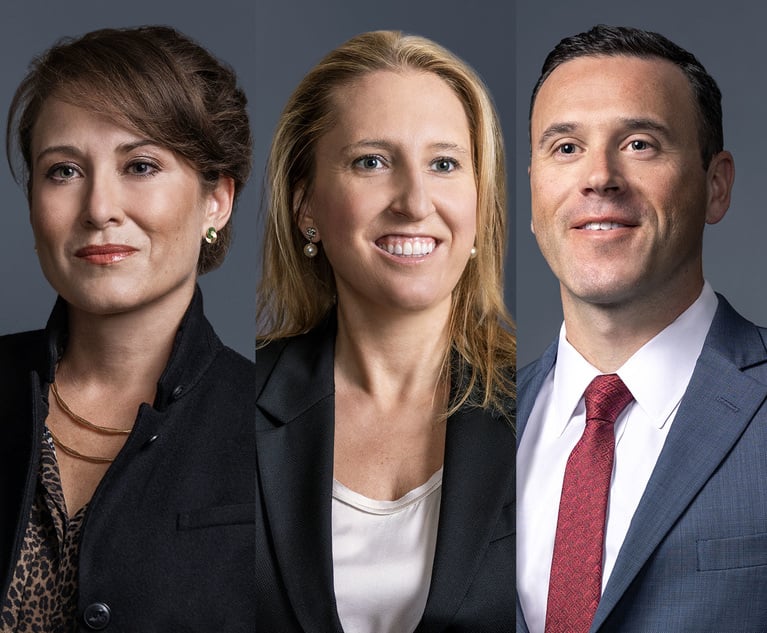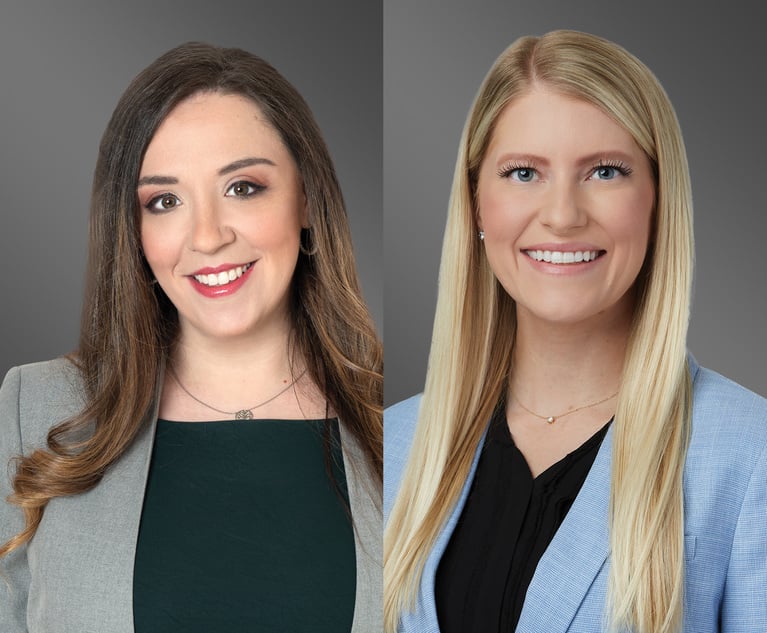In ICO Case, It's No Security, No Investors, No Problem
An SEC case, like a chain, is only as strong as its weakest link.
December 26, 2018 at 04:00 PM
6 minute read
 Robert Long, with Bell Nunnally.
Robert Long, with Bell Nunnally.
On Oct. 3, 2018, the Securities and Exchange Commission (SEC) filed an emergency enforcement action in federal court against Blockvest and its founder, Reginald Buddy Ringgold, III, aka Rasool Abdul Rahim El (“Ringgold”). SEC v. Blockvest, Case No. 3:18-cv-02287 (S.D. Cal. Oct. 3, 2018). In many ways, the case looked like a textbook securities fraud case with some extra sizzle because it involves an Initial Coin Offering (ICO) and a cryptocurrency exchange.
The SEC's complaint suggests that the defendants raised more than $2.5 million, and makes clear allegations of fraud and false statements. Among other things, the SEC alleges that the defendants falsely claimed that: the ICO and exchange were “approved” by the SEC; the company's offering is SEC Regulation A+ compliant; and they “partnered” with and would be “audited by” Deloitte Touche Tohmatsu Limited (“Deloitte”). The SEC's complaint also alleges Blockvest and Ringgold misused the SEC's seal, as well as the seal of the Commodities Futures Trading Commission and the National Futures Association (NFA) logo, and created a fictitious regulatory agency, the “Blockchain Exchange Commission.”[1] Based on the SEC's ex parte application for a temporary restraining order (TRO) freezing assets, prohibiting the production of documents, and granting expedited discovery and requiring an accounting, United States District Court Judge Gonzalo P. Curiel entered a TRO against the defendants on Oct. 5, 2018.
With the TRO entered, the battle over the preliminary injunction began. To obtain a preliminary injunction in an SEC enforcement case, the SEC must, generally, show: (1) a prima facie case of previous federal securities law violations; and (2) a reasonable likelihood that the violations will be repeated. Based on the TRO application, the SEC's case looked compelling. Nevertheless, attorneys for Blockvest and Ringgold mounted a rigorous defense.
Evidence was presented in a declaration by Ringgold that, although “mistakes were made, none of [the misrepresentations or omissions alleged by the SEC] was made in connection with the purchase and sale of securities.” According to Ringgold, Blockvest “never sold any tokens to the public.” Rather, Ringgold explained that Blockvest's tokens (“BLV”) were used for “testing and development” by “32 partner testers.” Ringgold also declared that Rosegold Investment, the manager of Blockvest, had only 17 investors, other than himself and Blockvest's CFO. Amazingly, nine of those investors submitted declarations in support of the defendants.[2] Yes, the defendants—not the SEC. Most of the nine stated that they did not buy BLV tokens or rely on any of the representations the SEC has alleged are false.
Moreover, with respect to the SEC's allegation that Ringgold had claimed to have raised $2.5 million, Ringgold stated that Blockvest entered into transactions, which “I thought raised approximately $2.5 million for Blockvest. But they did not.” According to Ringgold, he entered a transaction to exchange 10 percent of Blockvest for $2.5 million marketable cryptocurrencies, but the counter-party to the transactions never delivered the cryptocurrencies.
For its part, the SEC had a hole in its application. Although its application was chock-full of declarations, including declarations from a third party and employees of the NFA, Vanguard, Deloitte and the SEC, it did not include a single declaration from an investor. No investor to declare, “I bought BLV tokens” or “I invested in the ICO” or “I made my investment after reading Blockvest's whitepaper and hoped to make a profit.” The hole was costly.
On Nov. 27, 2018, the court denied the SEC's Motion for a Preliminary Injunction. With regard to whether the SEC had shown a prima facie case of federal securities law violations, the court first considered whether the SEC demonstrated a “security” was involved. Applying the Howey test, the court analyzed whether an “investment contract” was present—whether there was (1) an investment of money (2) in a common enterprise (3) with an expectation of profits to be produced by the efforts of others. See SEC v. W.J. Howey Co., 328 U.S. 293, 298-99 (1946); SEC v. Rubera, 350 F. 3d 1084, 1090 (9th Cir. 2003); SEC v. Shavers, Case No. 13-cv-414, 2014 WL 12622292 at *6 (E.D. Texas Aug. 26, 2014).
With respect to the first prong of the Howey test, the court found that there were disputed issues of fact. For example, the court noted the defendants presented evidence that they did not raise $2.5 million and the 32 “investors” were actually “testers.” As to the second prong of the Howey test, the court found that the SEC had failed to demonstrate that the “32 test investors” had an expectation of profits. The court also considered whether the 17 individuals who invested in Rosegold purchased securities. Again, however, the court found disputed issues of fact and referenced the nine individuals that had asserted that they did not buy BLV tokens or rely on any representations that the SEC has alleged are false.
In its order, the court next found that the SEC had failed to establish that the defendants were reasonably likely to continue to violate the federal securities laws. Given the foregoing, this is no surprise. The court also seemed swayed by Ringgold's assertion that he would not pursue the ICO and would provide the SEC with 30 days' notice if defendants decided to do so after all.
Blockvest and Ringgold won the battle. No preliminary injunction was entered. What is the takeaway? Well, given that the agency's mission is to “protect investors,” you would expect that they would talk to some before filing an enforcement action seeking such extraordinary relief—TRO, asset freeze, accounting, etc. Did they here? I don't know. But I bet they wish they had submitted an investor declaration or two. An SEC case, like a chain, is only as strong as its weakest link.
The SEC is not giving up, however. On Dec. 17, 2018, the staff filed a Motion for Partial Reconsideration stating that it had “grave concerns” about the court's order. Stay tuned….
[1] According the SEC, BEC was previously incorporated under various names, including “Fartlife.”
[2] Although not formally considered by the court, I understand defense counsel ultimately obtained declarations from the remaining Rosegold investors and some “testers,” as well.
Robert Long is a partner at Bell Nunnally in Dallas and a member of its Cryptocurrency/Bitcoin Regulation practice. He can be reached at [email protected].
This content has been archived. It is available through our partners, LexisNexis® and Bloomberg Law.
To view this content, please continue to their sites.
Not a Lexis Subscriber?
Subscribe Now
Not a Bloomberg Law Subscriber?
Subscribe Now
NOT FOR REPRINT
© 2025 ALM Global, LLC, All Rights Reserved. Request academic re-use from www.copyright.com. All other uses, submit a request to [email protected]. For more information visit Asset & Logo Licensing.
You Might Like
View All
M&A Transactions and AB 1824: Navigating New Privacy Compliance Challenges
7 minute read
What Will It Mean in California if New Federal Anti-SLAPP Legislation Passes?
9 minute read
Courts Demonstrate Growing Willingness to Sanction Courtroom Misuse of AI
4 minute read
For Growing Law Firms, Customizable Financing Can Unlock Opportunities
6 minute readTrending Stories
Who Got The Work
J. Brugh Lower of Gibbons has entered an appearance for industrial equipment supplier Devco Corporation in a pending trademark infringement lawsuit. The suit, accusing the defendant of selling knock-off Graco products, was filed Dec. 18 in New Jersey District Court by Rivkin Radler on behalf of Graco Inc. and Graco Minnesota. The case, assigned to U.S. District Judge Zahid N. Quraishi, is 3:24-cv-11294, Graco Inc. et al v. Devco Corporation.
Who Got The Work
Rebecca Maller-Stein and Kent A. Yalowitz of Arnold & Porter Kaye Scholer have entered their appearances for Hanaco Venture Capital and its executives, Lior Prosor and David Frankel, in a pending securities lawsuit. The action, filed on Dec. 24 in New York Southern District Court by Zell, Aron & Co. on behalf of Goldeneye Advisors, accuses the defendants of negligently and fraudulently managing the plaintiff's $1 million investment. The case, assigned to U.S. District Judge Vernon S. Broderick, is 1:24-cv-09918, Goldeneye Advisors, LLC v. Hanaco Venture Capital, Ltd. et al.
Who Got The Work
Attorneys from A&O Shearman has stepped in as defense counsel for Toronto-Dominion Bank and other defendants in a pending securities class action. The suit, filed Dec. 11 in New York Southern District Court by Bleichmar Fonti & Auld, accuses the defendants of concealing the bank's 'pervasive' deficiencies in regards to its compliance with the Bank Secrecy Act and the quality of its anti-money laundering controls. The case, assigned to U.S. District Judge Arun Subramanian, is 1:24-cv-09445, Gonzalez v. The Toronto-Dominion Bank et al.
Who Got The Work
Crown Castle International, a Pennsylvania company providing shared communications infrastructure, has turned to Luke D. Wolf of Gordon Rees Scully Mansukhani to fend off a pending breach-of-contract lawsuit. The court action, filed Nov. 25 in Michigan Eastern District Court by Hooper Hathaway PC on behalf of The Town Residences LLC, accuses Crown Castle of failing to transfer approximately $30,000 in utility payments from T-Mobile in breach of a roof-top lease and assignment agreement. The case, assigned to U.S. District Judge Susan K. Declercq, is 2:24-cv-13131, The Town Residences LLC v. T-Mobile US, Inc. et al.
Who Got The Work
Wilfred P. Coronato and Daniel M. Schwartz of McCarter & English have stepped in as defense counsel to Electrolux Home Products Inc. in a pending product liability lawsuit. The court action, filed Nov. 26 in New York Eastern District Court by Poulos Lopiccolo PC and Nagel Rice LLP on behalf of David Stern, alleges that the defendant's refrigerators’ drawers and shelving repeatedly break and fall apart within months after purchase. The case, assigned to U.S. District Judge Joan M. Azrack, is 2:24-cv-08204, Stern v. Electrolux Home Products, Inc.
Featured Firms
Law Offices of Gary Martin Hays & Associates, P.C.
(470) 294-1674
Law Offices of Mark E. Salomone
(857) 444-6468
Smith & Hassler
(713) 739-1250






